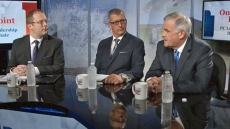OTTAWA — A big drop in pump prices helped slow Canada's annual inflation rate last month to 2.0 per cent as it offset rising costs of other goods, says Statistics Canada.
The statistical agency found prices rose in every major category of the consumer price index compared to a year earlier except for transportation — in large part due to the sharp fall in gasoline prices.
The agency's November reading, released Friday, showed the national inflation rate was below economists' expectations of 2.2 per cent following October's reading of 2.4 per cent.
Gasoline prices were 5.9 per cent lower than a year earlier amid a global slide in world oil prices, StatsCan said. The agency's gasoline price index fell 7.5 per cent in November — the fifth consecutive monthly decrease.
BMO chief economist Doug Porter wrote in a note to clients Friday that the deeper drop in pump prices in December will likely knock headline inflation down even further in the next report.
Porter also pointed out that Canada's November inflation rate remained about 0.7 percentage points above the U.S. reading of 1.3 per cent.
"That's not a bad thing when much of the industrialized world is grappling with inflation that's too low for comfort," he wrote.
"In some ways, Canada is facing almost an ideal inflation backdrop — not too hot, not too cold."
For specific goods in November, StatsCan found the biggest year-over-year price climbs were in natural gas at 14.7 per cent, meat at 12.2 per cent and cigarettes at 11.4 per cent.
Aside from gasoline, some of the major contributors to price decreases were travel tours at 10 per cent, video equipment at 9.3 per cent, digital computing equipment and devices at 4.2 per cent.
On a seasonally adjusted month-to-month basis, the agency said prices overall fell 0.2 per cent from November, after rising 0.1 per cent in October.
Consumer prices for November increased at a slower pace in every province compared to the previous year except for British Columbia, where inflation sped up slightly to 1.2 per cent from 1.1 per cent in October.
Ontario, meanwhile, registered the highest inflation of any province at 2.4 per cent. Prince Edward Island's inflation rate was the lowest at 0.1 per cent.
Core inflation, which excludes volatile items such as some food products and gasoline, also slowed in November to 2.1 per cent after a 2.3 per cent increase in October.
A consensus of economists had predicted the reading for core inflation would rise 2.4 per cent.
That core figure is closely watched by the Bank of Canada, which aims to keep it as close to its ideal two per cent target as possible. The core rate also helps the central bank decide whether to change the trend-setting interest rate, which has been locked at one per cent since September 2010.
In its latest rate announcement earlier this month, the bank acknowledged inflation had climbed faster than it had expected. However, it said the increase were due to the "temporary effects" of a lower Canadian dollar and price jumps in certain consumer sectors, such as telecommunications and meat.
"The pullback in both headline and core prices provides some heavy-duty support to the Bank of Canada's view that much of the prior run-up in (the consumer price index) was 'transitory,' " Porter said.
"The Bank of Canada now seems to be sitting pretty with both headline and core inflation almost bang-on the 2 per cent target."
"The pullback in both headline and core prices provides some heavy-duty support to the Bank of Canada's view that much of the prior run-up in (the Consumer Price Index) was 'transitory.' "
Statistics Canada also said the November core rate was pushed down by lower prices in the categories of clothing and footwear as well as recreation, education and reading.
On Friday, the agency also released October's numbers for retail trade, which remained flat at $42.8 billion.
The agency said the result came from lower sales for motor vehicle and parts dealers as well as gasoline stations, which were offset by higher sales in most of the other areas.




